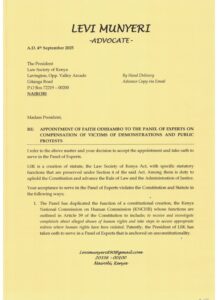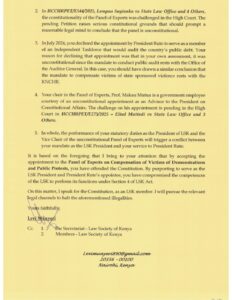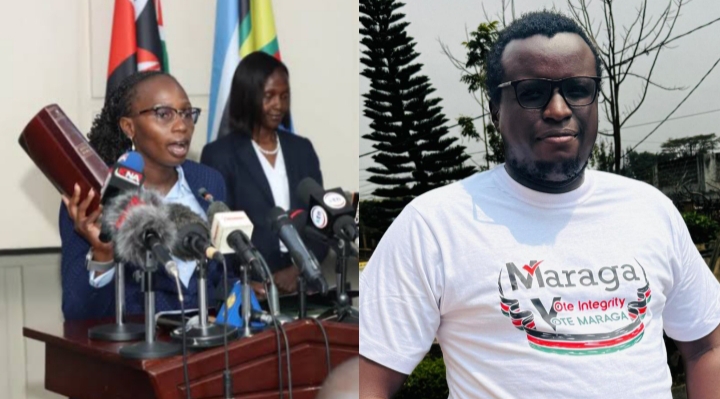The legal profession in Kenya has been thrown into heated debate after Law Society of Kenya President Faith Odhiambo agreed to take up a government appointment.
Her decision to serve as co-chair of a panel set up by President William Ruto to address compensation for victims of protests has sharply divided opinion within the society.
For many lawyers, the move is seen as a dangerous compromise of the independence of the LSK, while for others, it represents a chance to place the victims’ interests at the center of state decision-making.
Advocate Levi Munyeri has been among the loudest voices opposing Odhiambo’s choice.
Through a strongly worded statement and a formal letter addressed to her, he demanded that she resign from her role as LSK President, arguing that her acceptance of the position amounts to a violation of the Constitution and the LSK Act.
He warned that should she refuse, he would immediately file a petition for her removal.
His argument is rooted in the belief that the Constitution has already given the mandate of handling complaints on abuses of human rights, including redress for victims, to the Kenya National Commission on Human Rights under Article 59.
According to him, the newly created panel duplicates that role, making it unlawful.
Munyeri further supported his case by pointing to ongoing court cases questioning the legality of such appointments.
Among them is a petition by activist lawyer Lempaa Suyianka that challenges the establishment of the panel itself, and another case disputing the appointment of Professor Makau Mutua as Advisor to the President on Constitutional Affairs.
Since Mutua chairs the protest victims’ panel where Odhiambo now serves as vice chair, Munyeri argues that both appointments exist under legal doubt.
His criticism also draws attention to Odhiambo’s past actions. In 2024, she turned down an appointment to a government taskforce on public debt, citing the constitutional powers of the Auditor General.
He therefore questions why she has chosen to overlook the same principles this time.
For him, her dual role creates a clear conflict of interest and undermines the independence of the LSK, which by law should remain free from executive influence.
Odhiambo, however, has stood firm in her defense.
After her swearing-in on September 4, she admitted that her decision was controversial but insisted that her main focus was the victims of protests, many of whom were killed or injured. She dismissed claims of betrayal and promised transparency throughout the work of the panel.
This divide has left the legal community unsettled. Some see her involvement as giving victims a stronger voice, while others see it as weakening the independence of the LSK.
The broader question now is whether the society can maintain its traditional autonomy in the face of growing executive influence.
For Odhiambo, the decision has placed her leadership at a difficult crossroads, and the perception that she may have compromised the society’s principles could determine how her tenure is remembered.



